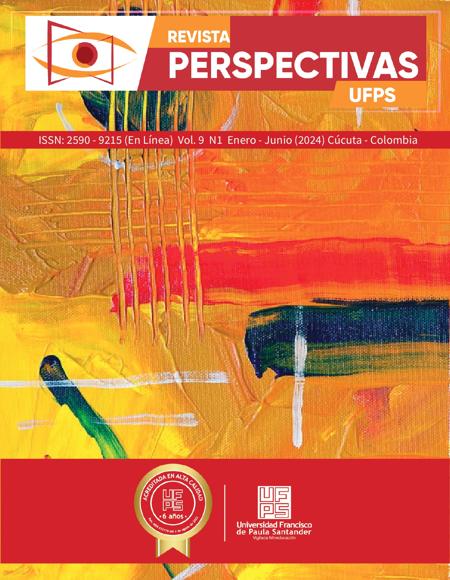Mecanismos alternos de resolución de Conflictos en Instituciones Educativas de Villanueva, La Guajira.
Alternative mechanisms for conflict resolution in Educational Institutions of Villanueva, La Guajira
Main Article Content
Alternative conflict resolution mechanisms are a fundamental tool for resolving disputes peacefully, which is why it is essential to address them from an early age in order to generate a culture of peace that lasts over time. This article presents evidence of the results of a qualitative research that had the purpose of establishing the alternative conflict resolution mechanisms used by teachers of educational institutions in the municipality of Villanueva, La Guajira. The methodology was approached from a qualitative approach, guided by the method of educational action, which allowed us to propose practical and concrete strategies to address a specific problem or situation in the educational field. Regarding the results and their analysis, they were carried out using the Atlas.ti 7 software, with a non-probabilistic sample. The findings that the research showed in the application of the in-depth interview and focus groups is the direct relationship that exists between the teaching of alternative conflict resolution mechanisms and the way in which students resolve their controversies, giving rise to that lack of knowledge regarding conciliation and mediation allows students, before going to dialogue, to resort to physical or verbal aggression impulsively. On the other hand, through the application of instruments it was possible to know the lack of implementation of conflict promotion and prevention strategies within the framework of school coexistence established by law 1620 of 2013.
Downloads
Publication Facts
Reviewer profiles N/A
Author statements
- Academic society
- Universidad Francisco de Paula Santander
- Publisher
- Universidad Francisco de Paula Santander
Article Details
Aguilar, M. A., & Castañón, N. (2014). Propuesta actividades y estrategias pedagógicas que promuevan una cultura de paz y capacidad de resolución de conflictos en instituciones educativas venezolanas. Revista de Comunicación de la SEECI, (34), 83-94. DOI: https://doi.org/10.15198/seeci.2014.34.83-94
Bonilla Blanchar, E. E. (2011). Metodología de la investigación, un enfoque practico. Gente nueva editorial.
Calderón, I. (2011). La Mediación en la Resolución de Conflictos en los Contextos Escolares. Acción pedagógica, (20), 42-57. http://www.saber.ula.ve/bitstream/handle/123456789/34325/articulo4.pdf;jsessionid =9017230962049A83603D5504A3BCBD03?sequence=1
Colprensa. (2019, septiembre 26). Estos son los departamentos del país con más casos de violencia escolar. El universal. https://www.eluniversal.com.co/colombia/estos-son-los-departamentos-del-pais-con-mas-casos-de-violencia-escolar-CE1798949
Congreso de Colombia. (2013, 15 de marzo). Ley 1620 de 2013. Secretaria del Senado. Diario Oficial No. 48.733. http://www.secretariasenado.gov.co/senado/basedoc/ley_1620_2013.html
Cortes-Suárez, R. (2017). Mediación escolar en Colombia.
De Armas Hernández, M. (2003). La mediación en la resolución de conflictos. Educar, 125-136. DOI: https://doi.org/10.5565/rev/educar.294
Delgado-Salazar, R., & Lara-Salcedo, L. M. (2008). De la mediación del conflicto escolara la construcción de comunidades justas. Universitas Psychologica, 7(3), 673-690.
De Prada, De Prado J., & López Gil, J. (2008). La mediación como estrategia de resolución de conflictos en el ámbito escolar. Documentación social, 148, 99-116.
Jiménez Cogollo, R., & Mercado Pérez, B. (2018). La mediación y la resolución de conflictos una alternativa para minimizar los problemas de convivencia en LA IETI Moisés Cabeza Junco de Villanueva, Bolívar. (Tesis de Maestría). Universidad Tecnológica De Bolívar. Cartagena de Indias, Bolívar.
Lozano Martín, A., Gutierrez Extremera, P., & Martinez Martín, R. (2018). La mediación educativa como Cultura de paz. Revista De Cultura De Paz, 2, 125–145.
Machado Hernández, A; González Ortega, G; Carbonel Manjarrez, T. (2012). Estrategias pedagógicas para la solución de conflictos escolares. Escenarios. Vol. 10 (1), 63-68. http://repositorio.uac.edu.co/handle/11619/1612 DOI: https://doi.org/10.15665/esc.v10i1.726
Malagón Buitrago, E., Mateus Gómez, M., & Gómez Carrillo, S. (2016). La convivencia escolar, un camino hacia la cultura de la paz. Educación y ciudad, (31), 43-56 DOI: https://doi.org/10.36737/01230425.v.n31.2016.1608
Martínez, M. (2018). La formación en convivencia: papel de la mediación en la solución de conflictos. Educación Y Humanismo, 20(35), 127–142. DOI: https://doi.org/10.17081/eduhum.20.35.2838
Martínez Trujillo, N. (2020). Investigación cualitativa, una mirada desde las ciencias sociales y humanas. Editorial Gente nueva.
Mayor Zaragoza, F. (2003). Educación para la paz. Revista de la Facultad de Educación. 2003, n. 6; p. 17-24. https://revistas.uned.es/index.php/educacionXX1/article/view/350/303 DOI: https://doi.org/10.5944/educxx1.6.0.350
Noticias RCN. (2022, Junio 07). ¡Preocupante! Colombia es uno de los países con más casos de bullying escolar en el mundo. https://www.noticiasrcn.com/colombia/alarmantes-cifras-de-bullying-en-colombia-421220
Pizarro Elizo, S. (2018). Calidad y mejora de la educación: mediación en instituciones educativas. Tendencias pedagógicas, (31), 207-226. DOI: https://doi.org/10.15366/tp2018.31.012
Redacción El tiempo. (2022, marzo 14). Las riñas escolares, cada vez más violentas en los entornos. El tiempo. https://www.eltiempo.com/bogota/rinas-en-colegios-de-bogota-son-cada-vez-mas-violentas-por-que-658164
Revista Semana. (2020, mayo 2). Acoso escolar: uno de cada tres estudiantes son víctimas. https://www.semana.com/educacion/articulo/acoso-escolar-uno-de-cada-tres-estudiantes-son-victimas/667742/








